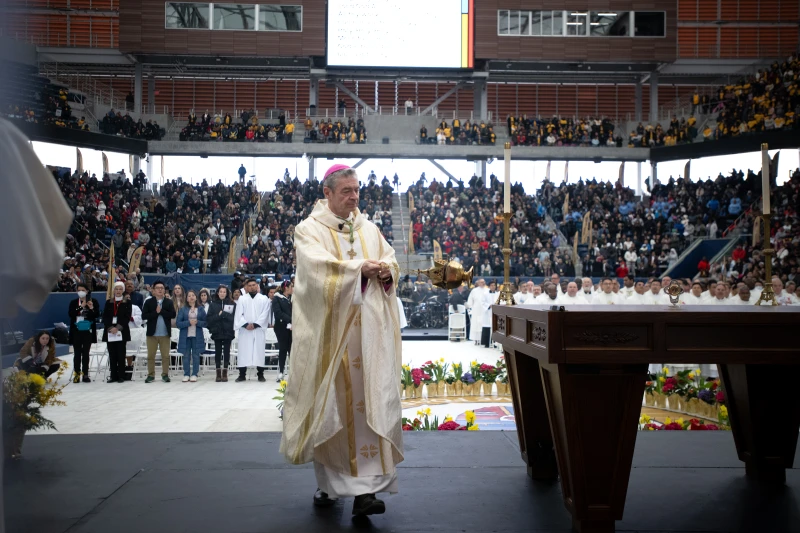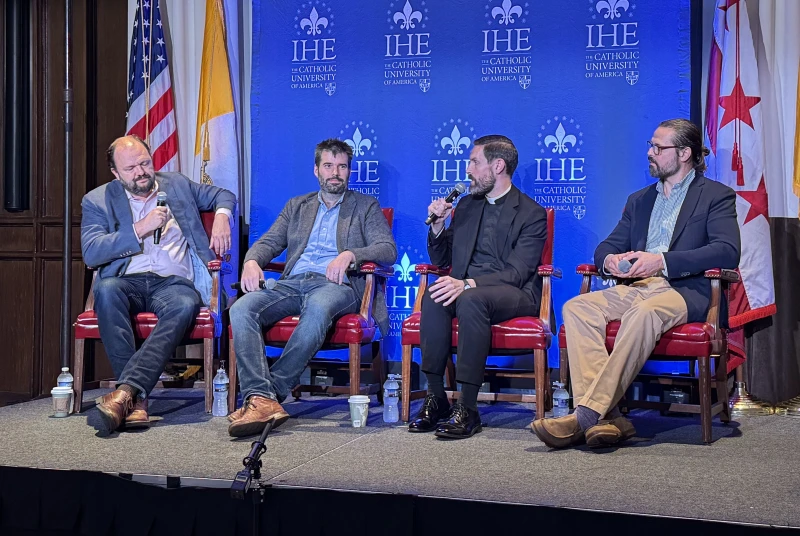

Brooklyn Bishop Robert Brennan carries the thurible around the altar inside Louis Armstrong Stadium on April 20, 2024. / Credit: Jeffrey Bruno
Washington, D.C. Newsroom, Sep 30, 2025 / 17:32 pm (CNA).
Brooklyn Bishop Robert Brennan is calling on the faithful to contact New York Gov. Kathy Hochul to oppose the assisted suicide legislation that currently awaits her signature.
“Our fight against assisted suicide is not over,” Brennan said in a post on the social media platform X.
Assisted suicide is not yet legal in New York, but the Medical Aid in Dying Act was passed by the state Legislature in June and will become legal upon Hochul’s signature. The law will allow terminally ill New York residents who are over 18 to request medically assisted death.
“Gov. Hochul, we know difficult decisions weigh heavily on leaders and you carefully consider the impact of every decision on New Yorkers,” Brennan wrote. “As you review the assisted suicide legislation, we respectfully urge you to veto it.”
“Assisted suicide targets the poor, the vulnerable, and especially individuals suffering with mental illness. There are better ways to support those facing end-of-life challenges, through improved palliative care, pain management, and compassionate support systems.”
In a video to the faithful, Brennan addressed Hochul and said: “You championed New York’s suicide prevention program and invested millions of dollars to, as you said, ‘ensure New Yorkers are aware of this critical resource.’ That groundbreaking program has worked to provide the right training and crisis intervention measures to prevent suicides.”
Hochul has previously launched several campaigns to bring New York suicide rates down including a crisis hotline and initiatives to help schools, hospitals, first responders, and veterans. She has also helped develop and fund a number of youth suicide prevention programs.
The programs offer “hope to those who are most in need,” Brennan said. He added: “But now you are being asked to sign a bill that contradicts your efforts and targets high-risk populations. How can we justify preventing suicide for some while helping others to die?”
In support of the New York State Catholic Conference’s mission to “work with the government to shape laws and policies that pursue social justice, respect for life, and the common good,” Brennan asked the faithful to message the governor directly with a pre-written email to stop the legislation.
“I urge Catholics to reach out to Gov. Hochul now and to ask her to stay consistent on this issue,” Brennan said. “Let us continue to pray for the respect of all life and the human dignity of all people.”
Lobbying against the legislation is ‘critical’
Catholic bioethicist Father Tad Pacholczyk told CNA that “it’s critical” that New Yorkers “respond to the bishop’s call for action.”
“The push of anti-life forces has continued unabated for many years, and the incessant turning of the wheels of their finely-tuned propaganda machine has managed to gradually draw more and more of us into a perspective of complacency when it comes to physician-assisted suicide,” he said.
Pacholczyk added: “Combined with a tendency to substitute emotion for ethical reasoning, prevalent in much of the media and society, I think we stand on the edge of a well-greased slope, poised to hurl down headlong.”
The bioethicist highlighted that if assisted suiside “is not outlawed and strong protections for vulnerable patients are not enacted,” the U.S is likely to replicate the repercussions seen in Canada, which is experiencing disproportionately high rates of premature deaths among vulnerable groups.
“We need to do what we can to light a fire and raise heightened awareness of the rights of patients not to be pressured in this manner,” Pacholczyk said. “We also need to take steps to offer real support and accompaniment to our loved ones as they pass through one of the most important stretches of their lives, so their journey can be indelibly imprinted by a genuinely good and holy death.”
Read More
